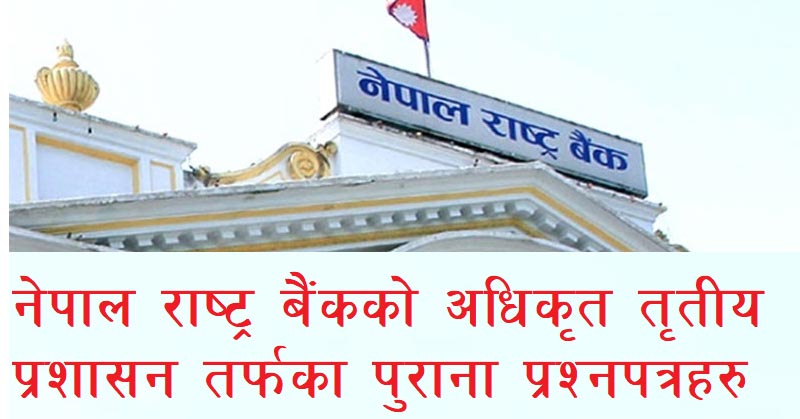
Nepal Rastra Bank Officer Third Level (Open Competitive examination) Old question Paper.
Exam Date: 2066/05/01
Paper: First Paper
Time: 4 Hours
Total Marks: (10x10)= 100
Subject: Financial Management, Development Economics, and International Trade
Financial Management, Development Economics, and International Trade)
Group (A) - Microeconomics:
1. Distinguish between inductive and deductive methods in economics. Which method, in your opinion, is more appropriate in microeconomics? Why?
2. What is a monopolistic competition? How price and output are determined under it in the long run? In what respect it is different under perfect competition?
3. How is consumer's equilibrium achieved under indifference curve condition? Illustrate the price effect on the consumer's equilibrium, separating it into the income effect and substitution effect.
4. Explain the nature of the cost curves. How is the long-run average cost curve derived?
Group (B): Financial Management
5. What do you mean by financial statement analysis? Shed light on the ratio analysis technique with examples of at least five major ratios.
6. What do you know about the financial sector reforms in Nepal? Highlight the nature, need and implications of such reforms.
7. What do you mean by financial derivatives? Why are they called derivatives? Highlight the main features of derivative instruments: option, swap, and futures.
8. What is the best combination of debt and equity in capital structure management? Explain with reasons.
Group - (C): Development Economics
9. What are the structural characteristics of developing countries? Describe them in the context of Nepal supported by facts and figures.
10. What are the patterns of migration in Nepal? What factors influence migration decisions and destinations? State the major impacts of migration in Nepal.
11. What are the critical constraints to Nepal's economic development? What measures would you suggest to put Nepal on a path to inclusive and sustainable development?
12. Critically examine major issues and challenges with regard to attracting foreign direct investment (FDI) in Nepal. What improvements need to be made in policies and regulations to attract FDI? Discuss.
Group (D): International Trade
13. What do you understand by disequilibrium in the balance of payments? Write down the necessary conditions for devaluation to correct the disequilibrium in the balance of payments.
14. Discuss the relative merits of export promotion and import substitution strategy in the present stage of Nepal's development. Suggest suitable measures to your preference.
15. Assess how far Nepal has been able to benefit from the membership of the World Trade Organization. What are the major problems in this regard? Explain the measures undertaken by the Government to resolve these problems.
16. What is the pegged exchange rate regime? Write down the arguments for and against floating Nepali currency with the Indian currency.
==============================================================================
Paper: Second Paper
Time: 4 Hours
Total Marks: (10x10)= 100
Subject: (Macroeconomics, Monetary and Fiscal Policies, General Management and Human Resource Management)
Group A: (Macroeconomics)
1. What is inflation? What are the costs of inflation? How the inflation in Nepal can be controlled with monetary and fiscal policy instruments?
2. What is the national income? How it is measured? Explain the reasons for its underestimation in developing countries like Nepal.
3. What is the Harrod — Domar model? Why it is still very much used for determining investment requirements for achieving targeted growth rates in the national plan? Explain some of its weaknesses and the measures for rectification.
4. What is the structural adjustment policy? Explain how it differs from the stabilization policy. In the present Nepalese context, which one do you recommend for the policymakers? Explain the reasons for your recommendation.
Group B: (Monetary and Fiscal Policies)
5. Explain precisely the concepts of money supply, high powered money & money multiplier and also identify the determinants of the money supply.
6. Discuss the main features of the current monetary policy of Nepal and also examine critically the role played by Nepal Rastra Bank for sustaining monetary and financial stability in Nepal.
7. Why do people demand money? Discuss with reference to theories relating to demand for money. Explain the importance of the study of demand for money in monetary planning.
8. How does budget deficit crowd out private investment? Do you think that increasing budgetary deficit in Nepal has crowding-out effects? Justify your answer with facts.
Group C: (General Management)
9. "The degree of involvement of managers with various management processes may differ from manager to manager. But all managers have to be concerned with all the processes in an organizational set-up." Elaborate this statement in light of the emerging concepts in Management.
10. "Total Quality Management (TQM) requires a transformation in thinking about how you view your clients, suppliers, and shareholders." Explain this statement citing any research evidence.
11. Briefly examine the concept of transactional leadership. In what way does it differ from transformational leadership? Explain.
12. What issues are involved in group decision-making in an organization? How would you use the Delphi Technique to improve it? Discuss.
Group C: (Human Resource Management)
13. What do you understand by Strategic Human Resource Planning? Explain its importance in creating a competitive advantage for an organization.
14. The performance evaluation system is easy to design but difficult to implement. In the context of this statement, explain some of the difficulties in effective implementation of performance evaluation system particularly in the context of career development and teamwork management.
15. Describe a flexible working system. How can this system contribute to employee motivation and quality of work-life?
16. What do you understand by Organizational Citizenship Behavior (OCB)? How would employee empowerment policy contribute to promoting OCB climate? Discuss.





